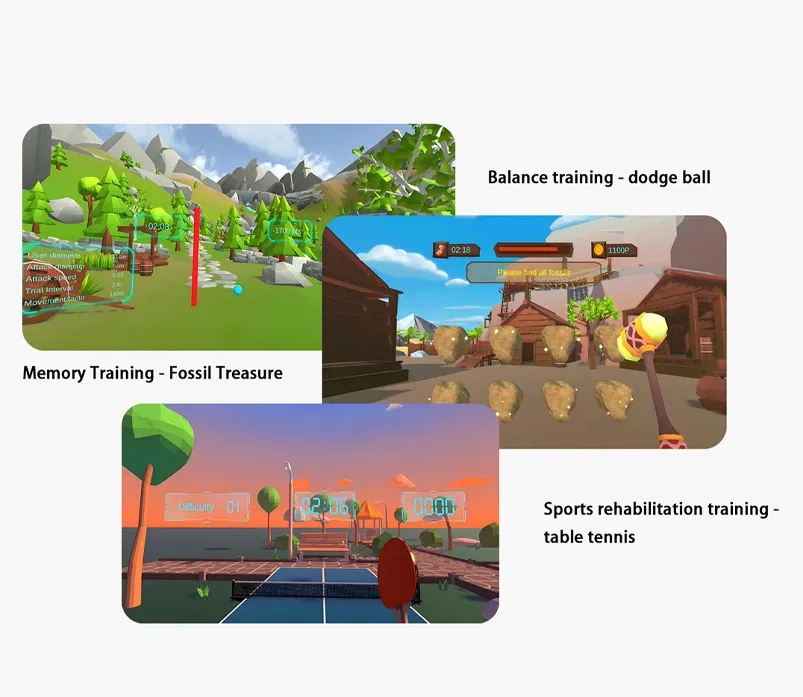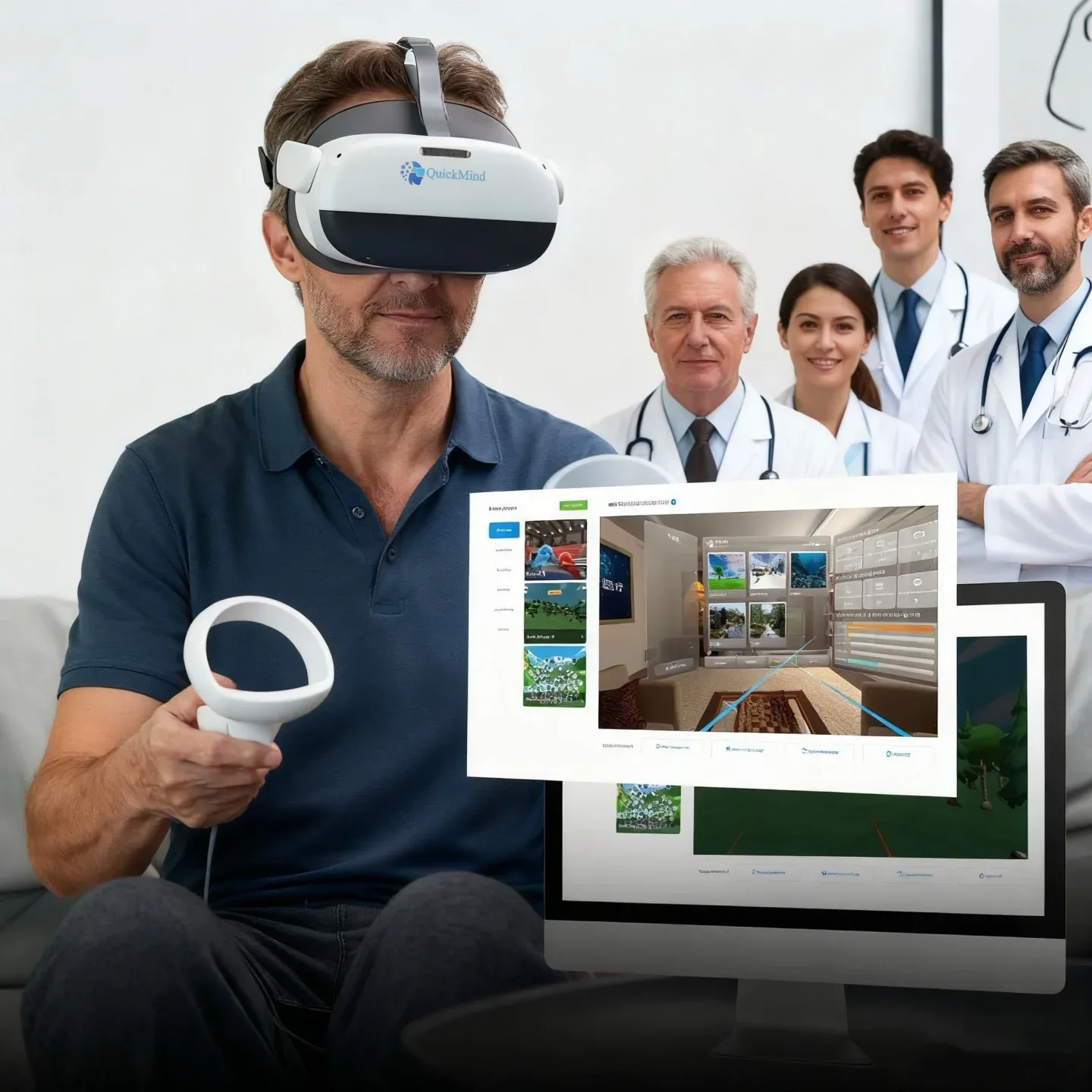
Advancing assessments reveals that virtual simulation program can profoundly enhance the well-being of patients affected by cognitive decline. By shifting them to relaxing settings, VR provides a exceptional avenue for mental involvement, mood control, and socialization. Various analyses have shown that VR therapy can minimize uneasiness, nervousness, and despondency in dementia clients while also elevating their cognition, heedfulness, and verbal abilities.
- VR empowers clients with dementia to reminisce fond remembrances through engaging animations.
- In addition, it can yield a secure and facilitative space for community involvement, promoting a realization of association and fitting in.
- Experts hold that VR therapy has the capacity to remodel dementia treatment by contributing new and creative approaches to manage the complex obstacles faced by subjects affected by this syndrome.
Innovative Tech Treatments for Alzheimer's
Expanding digital treatments are gaining recognition in the domain of memory advancement for subjects dealing with Alzheimer's disease. These tools utilize digital innovation to stimulate brain processing and hypothetically impede the worsening of the malady. Playful workouts, personalized feedback, and psychological training are some samples of techniques being investigated in this dynamic territory. While examinations are progressing, digital therapeutics offer a supportive option for augmenting the experiences of those affected by Alzheimer's dementia.Exploring Virtual Worlds: Innovative Methods for Alzheimer's Care
In relation to people combating Alzheimer's disease, the steady diminution of recollection and neural capabilities can markedly influence their competence to socialize with the world around them. This harmful illness often produces in separateness, agitation, and a lessened self-awareness. Latest improvements in virtual reality technology deliver a cutting-edge option to combat these obstacles by producing immersive worlds that can encourage the brain and restore cognitive function.
Digital immersive sceneries formed specifically for Alzheimer's patients can send them in familiar venues, such as their childhood abode or a preferred green space, awakening positive memories and mitigating anxiety. Through interactive tasks, these virtual realms can also challenge cognitive abilities like remembrance, concentration, and problem-solving.
The likely improvements of virtual reality in Alzheimer's intervention are extensive. Early examinations have confirmed promising results, with participants reporting improvements in cognitive operation, mood, and overall quality of life. As this innovation develops, it holds the key to revolutionizing the way we approach Alzheimer's disease, delivering a new pathway for management and motivation.
Computer-Aided Reminiscence for Alzheimer's Victims
Reminiscence therapy is a commonly used technique used to advance cognitive function and quality of life in individuals with Alzheimer's disease. This customary form of therapy involves eliciting patients to remember past experiences, often through dialogue. However, a pioneering approach is emerging: VR-mediated reminiscence therapy.
This immersive solution utilizes virtual reality headsets to immerse patients in virtualized environments that invoke memories from their past. By recapturing these digital reconstructions, individuals with Alzheimer's can interact with their past in a powerful way.
VR's Promise for Dementia Care: Enhancing Memory and Cognition
Virtual reality (VR) is emerging as a potential instrument in the fight against dementia, providing revolutionary ways to stimulate memory and cognition. By creating immersive settings, VR can empower individuals with dementia reexperience memories, take part in meaningful activities, and boost cognitive abilities. Studies have shown that VR interventions can bring about substantial improvements in memory recall, attention, and positional awareness. Moreover, VR provides a protected and encouraging space for individuals with dementia to engage, reducing feelings of isolation and worry.
- Additionally, VR can be fitted to individual needs and preferences, granting enhanced levels of communication.
- In spite of the promise of VR, extended research is needed to fully understand its long-term impact in dementia care.
Renewing Memories, Enhancing Relationships: VR for Alzheimer's Social Health
Digital synthetic settings is emerging as a revolutionary technology in the branch of Alzheimer syndrome. By building engaging and responsive platforms, VR has the prospect to stimulate memories, encourage social interaction, and raise the overall quality of life for patients struggling with Alzheimer's. Specifically a major influential aspects of VR is its ability to carry users to cherished environments and occasions from their past. Whether it's a ramble through a childhood home or a imitation of a beloved holiday, these virtual visits can stimulate happy memories and improve cognitive operation. Furthermore, VR can encourage social interaction by engaging individuals with others who share similar preferences. This can be particularly constructive for people with Alzheimer's who may encounter obstacles with traditional social mixing. By delivering a safe and captivating virtual space, VR can lessen feelings of isolation and loneliness, which are common among persons affected by Alzheimer's. Overall, VR holds immense potential for improving the lives of subjects with Alzheimer's by reviving memories, strengthening connections, and refining their quality of life. As technology advances to improve, we can expect even more creative applications of VR in the field of dementia care.Applying Cognitive Training: Employing VR Tools for Alzheimer's Care
Augmented reality experiences is rapidly emerging as a innovative tool in the realm of cognitive training, particularly for individuals suffering from Alzheimer's disease. By immersing patients in interactive and engaging virtual environments, VR-based interventions can enhance cognitive functions such as memory, attention, and problem-solving. These games usually incorporate elements of storytelling, exploration, and social interaction, making the training process significantly appealing. Studies have shown that VR-based cognitive training can lead to marked improvements in cognitive performance, possibly delaying the progression of Alzheimer's symptoms. Moreover, VR provides a safe and controlled environment for patients to practice new skills and grow their confidence.
- Game elements in VR training can make it deeply absorbing and pleasant for clients with brain function issues.
- VR simulations can offer convincing scenarios that challenge and stimulate cognitive functions.
- Personalized VR experiences can cater to particular desires and modalities.
Using Simulated Worlds to Aid Dementia Care
Enveloping simulated worlds offer a new and positive avenue for persons suffering dementia. These approaches can generate familiar environments, allowing those affected by cognitive decline to immerse in cherished memories and build a sense of ease. By countering the issues of dementia, VR spaces have the capacity to improve quality of life for both individuals and their caregivers.
- Assessments indicate that VR techniques can substantially impact cognitive function, social well-being, and even motor abilities in individuals with dementia.
- Moreover, VR furnishes a safe and managed environment for engagement, reducing the risk of stress.
- In addition, VR can enhance social contacts by allowing individuals with dementia to communicate in simulated activities with others.
Utilizing Virtual Reality for Early Alzheimer's Identification and Management
cognitive Alzheimer's illness poses a elaborate obstacle, often being latent in its early stages. Despite this, virtual reality (VR) is unfolding as a transformative tool for initial identification. Through immersive experiences, VR can measure cognitive operation in ways that traditional methods struggle to. This ability allows for speedy involvement strategies, potentially stalling disease progression and improving the quality of life for persons with Alzheimer's.
- Immersive virtual tests evaluate cognitive functions like recall and focus in protected settings.
- Tailored VR programs enable patients to partake in mental activation tasks.
- Augmented virtual areas support engaging exchanges for persons with Alzheimer's.
Closing the Divide: VR for Communicative and Interactive Dementia Support
{In the realm of dementia care, innovative technologies are emerging to advance the lives of subjects facing dementia challenges. Virtual reality (VR) is one such resource that holds immense capability for narrowing social gaps and boosting communication with dementia clients through VR. By constructing engaging artificial realities, VR can boost cognitive function, reduce behavioral issues, and ultimately improve the overall well-being of persons diagnosed with dementia.
VR experiences adapted to dementia patient needs can range from reminiscence therapy sessions that fade patients back into earlier life scenes, to interactive games that promote social interaction and cognitive challenge. Furthermore, VR has the aptitude to connect participants in dementia care with associates, regardless of physical separation, fostering a sense of acceptance.
- VR can facilitate in reducing agitation and anxiety by providing a calming and focusing environment.
- Clinical trials have shown that VR interventions can lead to improvements in cognitive function, mood, and social interaction in persons living with cognitive impairment.
- As technology advances in cognitive function reheablation progress, we can expect even more innovative and {effective|beneficial|helpful|powerful|impactful|successful|productive|efficient
